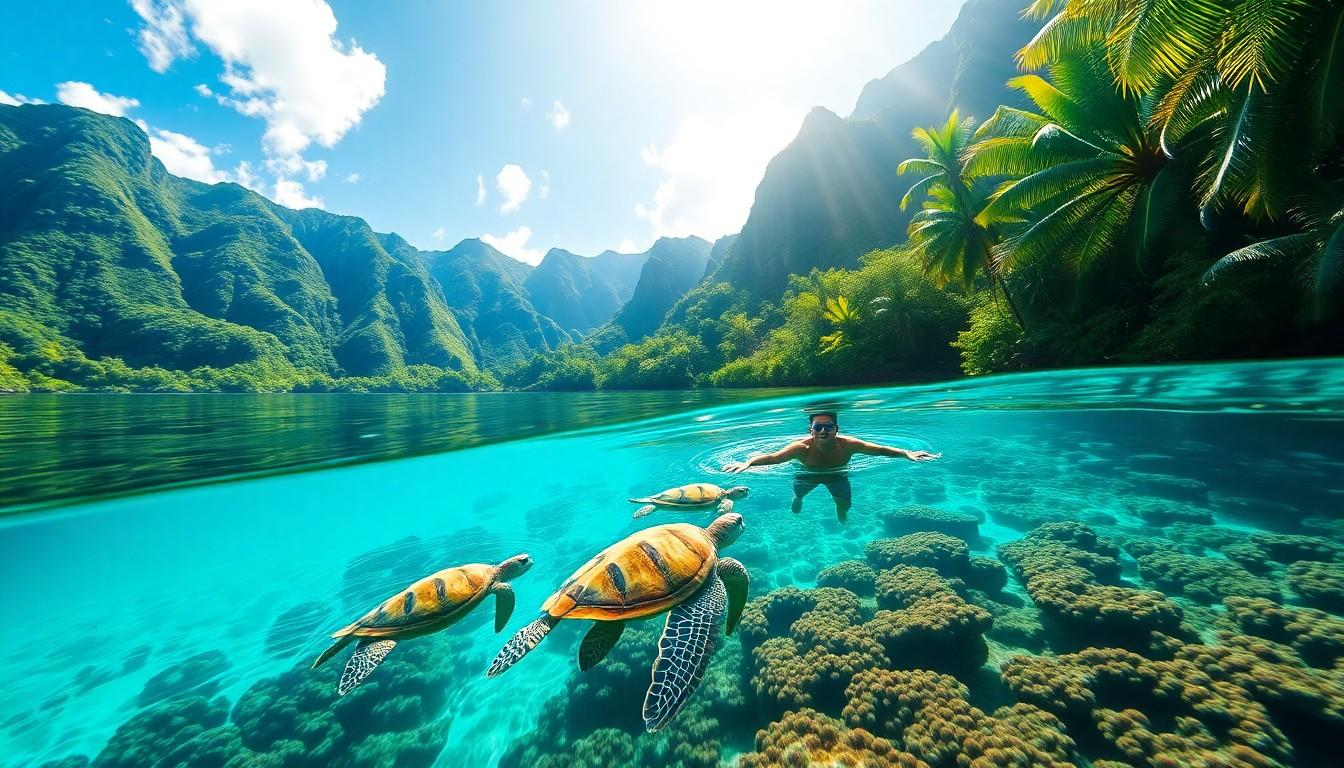
Eco Tourism Hawaii: Uncover the Secrets to Sustainable Adventure in Paradise
Hawaii isn’t just a paradise for sunbathers and surf enthusiasts; it’s also the ultimate playground for eco-conscious travelers. Imagine swapping the crowded beaches for lush rainforests and pristine coral reefs, all while sipping a fresh coconut and basking in the Aloha spirit. Eco-tourism in Hawaii offers a unique opportunity to explore the islands’ natural beauty while treading lightly on the environment.
From snorkeling with sea turtles to hiking volcanic landscapes, there’s no shortage of adventures that don’t leave a hefty carbon footprint. Plus, who wouldn’t want to experience the thrill of spotting a humpback whale or witnessing a stunning sunrise from atop a volcano? So grab your reusable water bottle and sunscreen, and get ready to dive into a world where fun meets sustainability in the most breathtaking way possible.
Eco Tourism Hawaii
Eco-tourism in Hawaii focuses on sustainable travel that respects the islands’ natural and cultural resources. Diverse ecosystems, including coral reefs and lush rainforests, provide unique opportunities for environmentally-conscious experiences. Activities like snorkeling with sea turtles and hiking through volcanic terrains allow travelers to connect with Hawaii’s stunning landscapes.
Conservation efforts play a significant role in eco-tourism. Local organizations often lead initiatives aimed at protecting Hawaii’s fragile ecosystems. Guided tours frequently emphasize education and awareness to foster a deeper understanding of local wildlife and habitats. Travelers engage with knowledgeable guides, who share insights into native species and conservation challenges.
Sustainable accommodations also enhance the eco-tourism experience. Many hotels integrate green practices, such as energy-efficient systems and waste reduction programs. Selecting lodgings that prioritize sustainability contributes to minimizing travel’s environmental footprint. Eco-friendly amenities make it easier for visitors to align their travel choices with their values.
Community-based eco-tourism initiatives promote cultural immersion while supporting local economies. Tourists often participate in cultural activities, such as traditional Hawaiian luaus or hula dance lessons. These experiences not only enrich their understanding of Hawaiian customs but also benefit local artisans and businesses.
Ultimately, eco-tourism in Hawaii fosters a relationship between the land, the environment, and its visitors. By prioritizing sustainable practices and engaging in conservation, travelers can enjoy the islands while preserving their beauty for future generations.
Benefits of Eco Tourism

Eco-tourism in Hawaii provides numerous benefits, enriching the travel experience while safeguarding the environment and cultures. Travelers contribute to conservation efforts through responsible choices.
Environmental Impact
Eco-tourism significantly reduces negative effects on Hawaii’s ecosystems. Wildlife encounters, like snorkeling with sea turtles and observing whales, help promote awareness and conservation. Tour companies often practice sustainable methods, minimizing waste and preserving natural habitats. Renewable energy sources, such as solar power, play a crucial role in many eco-friendly accommodations. Protecting coral reefs and rainforests becomes a shared responsibility among visitors and local communities. Sustainable tourism practices also encourage stricter regulations that help maintain the pristine environment of the islands.
Cultural Preservation
Cultural preservation thrives within the eco-tourism framework in Hawaii. Engaging in local traditions, like participating in luaus and learning hula, fosters respect for indigenous practices. Tourists support local artisans and musicians by purchasing handmade crafts and attending performances. Educational experiences highlight the importance of cultural heritage, ensuring its continuation for future generations. Strong emphasis on community involvement encourages meaningful interactions between travelers and residents. These connections enhance cultural understanding and appreciation, creating a harmonious relationship between visitors and the islands’ unique heritage.
Popular Eco Tourism Activities
Hawaii offers a range of eco-tourism activities that allow travelers to connect with nature and support sustainability. From hiking in lush forests to experiencing marine life, these activities highlight the islands’ unique ecosystems.
Hiking and Nature Tours
Hiking tours showcase Hawaii’s diverse landscapes, featuring rainforests, volcanic terrains, and stunning coastal views. Trails range from easy strolls to challenging hikes, accommodating all fitness levels. Guided tours often emphasize environmental education, providing insights into local flora and fauna. Popular destinations like Haleakalā National Park and the Na Pali Coast draw adventurers seeking breathtaking vistas and tranquil surroundings. Engaging with knowledgeable guides enhances understanding of conservation efforts and cultural significance linked to the land.
Marine Life Experiences
Experiencing Hawaii’s marine life presents unique opportunities for eco-conscious travelers. Snorkeling and diving excursions allow visitors to observe colorful coral reefs and diverse fish species in their natural habitats. Interactions with sea turtles and manta rays occur responsibly, ensuring minimal disruption to wildlife. Whale watching tours in season provide glimpses of majestic humpback whales while promoting awareness of marine conservation. Kayaking trips along the coastline enable exploration of sea caves and ancient coastal ecosystems. These activities foster appreciation for oceanic health and encourage protective measures for aquatic environments.
Eco-Friendly Accommodations in Hawaii
Eco-friendly accommodations provide visitors with options that align with sustainable travel values. Many lodgings utilize green practices, such as renewable energy and water conservation technologies.
Sustainable Lodging Options
Eco-resorts and green hotels in Hawaii often feature locally sourced materials and energy-efficient designs. Properties like the Kapalua Villas and the Four Seasons Resort Lanai prioritize environmental sustainability while offering comfortable stays. Guests find organic amenities and eco-friendly furnishings in these spaces. Additionally, several bed and breakfasts implement recycling and composting programs to minimize waste. While enjoying their stay, travelers experience firsthand the benefits of making eco-conscious choices in lodging.
Local Impact
Selecting sustainable accommodations results in direct benefits for local communities. Travelers support small businesses and contribute to the local economy by choosing these lodgings. Many eco-friendly hotels partner with indigenous organizations to preserve cultural heritage and promote local traditions. Initiatives often include guided eco-tours or artisan workshops that educate visitors about local customs. These connections foster appreciation for Hawaiian culture while ensuring that tourism dollars benefit local families and communities. Supporting such lodging options enhances the overall travel experience and strengthens relationships within the community.
Challenges Facing Eco Tourism in Hawaii
Eco-tourism in Hawaii faces significant challenges that impact both its sustainability and effectiveness. Over-tourism strains natural resources and creates conflicts between visitors and residents.
Over-Tourism Issues
Over-tourism results in overcrowded attractions that disrupt local ecosystems. Increased foot traffic leads to erosion and habitat damage in sensitive areas, such as the Na Pali Coast and Hanauma Bay. These impacts detract from the visitor experience, making it essential to manage access effectively. Local governments and organizations work to implement visitor caps and regulations to address this growing concern. Educating tourists about respecting the environment helps mitigate some adverse effects while promoting a more responsible travel culture.
Conservation Efforts
Conservation efforts remain critical in maintaining Hawaii’s unique ecosystems. Local organizations, such as the Hawaii Island Conservation Initiative, actively engage in habitat restoration projects. These initiatives protect endangered species and restore coral reefs damaged by climate change and pollution. Sustainable practices, including the establishment of marine protected areas, contribute to preserving these vital landscapes. Collaborating with eco-tourism operators enhances awareness and highlights the importance of conservation to visitors. Effective education on local wildlife encourages responsible interactions, reinforcing eco-tourism’s role in protecting Hawaii’s natural heritage.
